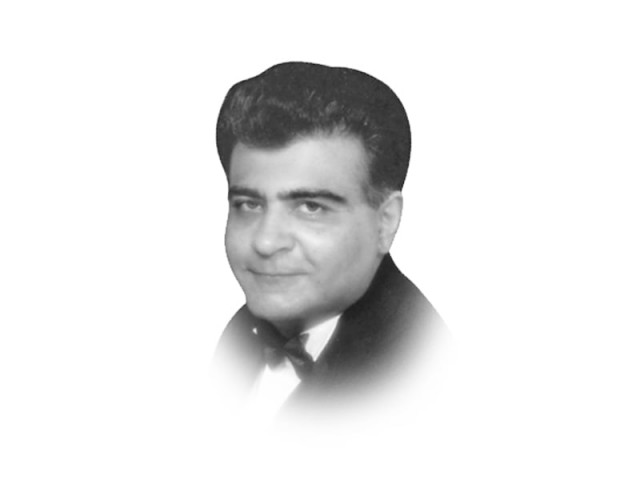A cheer and a half for Imran
In comparing PTI manifesto with that of the PPP, the PML-N, one does not find his to be decisively more compelling.

A cheer and a half for Imran
To answer these questions, one must fully understand Pakistan’s patronage-driven political economy. A merit-driven economy is one where people’s fortunes largely depend on what they know, i.e. their skills. A patronage-driven economy is one where they depend on who they know, i.e., their contacts. Pakistani voters consist of two main groups. The first is the privileged well-educated, one-quarter which largely thrives on ‘merit’. Its economic fortunes and political decisions are largely delinked from its cultural contacts, and it focuses mainly on policy and integrity issues in politics. The ‘rest’ lack good education and must compete for scarce opportunities, as acquiring merit is beyond their reach. So their success depends critically on family contacts and consequently, their political choices are fused with their cultural context. Thus, traditional Pakistani families serve not only cultural but also economic and political functions.
Dynastic politics is largely an outcome of this fusion of politics, economics and culture since family contacts get transmitted across generations. Thus, most Pakistanis vote for persons linked to their family networks. Living near poverty and requiring immediate assistance, their main expectation from the elected is that they will focus on solving their particular problems immediately. Rational policies and broad-based development — whose fruits may not accrue to them immediately or perhaps even ever — mean little to these people. Unsurprisingly, most Pakistani politicians focus on satisfying the particularistic demands of their vote bank through corruption, development funds and influence with local officials. Thus, what understandably represents corrupt, incompetent politics for the middle-class minority constitutes the lifeline for the poor majority given their limited options. Getting them to risk abandoning their tested patronage networks for a new party requires long grass-roots public service presence in poor areas, which Imran cannot easily establish before the next elections.
However, the ‘best’ have the economic cushion to try the untested. Unsurprisingly, Imran appeals mainly to urban middle classes. However, even there, he disappoints committed liberals because of his conservatism. While liberals constitute a small minority, even many in the larger category of ideologically flexible ‘practical’ people question whether he has practical ideas to rejuvenate Pakistan. Unfortunately, in comparing his manifesto with that of the PPP and the PML-N, one does not find his to be decisively more compelling. The economic, social and governance sections of all three parties are fairly similar (Imran’s foreign/security section is more hawkish). Neither does he distinguish himself by running his party democratically (through internal elections) and transparently (by having party accounts audited and shared publicly). Although these issues afflict the other two parties more, practically they are a bigger problem for Imran, since the promise of good governance is his main selling point while the other two parties appeal through patronage promises instead. His track record of financial integrity and achievements in sports and philanthropy clearly differentiates him from other politicians and attracts many people. However, this alone may not convince enough voters to ensure him a majority. Thus, while fully recognising the limited evidence available, my tentative prediction is that he will win not a majority but a handy minority of seats in the next election.
Does this mean that his detractors are right in dismissing him as inconsequential? Even though one may not vote for him, there is something about his ascendency for everyone to cheer about, including liberals. First, since there will always be some right-wing opposition, having a more honest and professionally accomplished opponent than current ones instinctively appeals to a liberal mind. His strong focus on financial integrity and a track record to back it up is crucial in Pakistan’s corruption laden landscape. Second, he is attracting a large number of those people towards voting who otherwise support undemocratic technocratic and military options. Third, even his limited success could inspire more middle-class people to compete in politics and encourage the emergence of better right and left-wing middle class parties later. Fourth, in supporting him, people are implicitly accepting the liberal position that politicians’ unconventional marital and extramarital personal pasts are politically irrelevant. Finally, though rumours abound about his establishment links, one must discount them in the absence of strong evidence. Moreover, in today’s open Pakistan, the establishment will struggle to contrive a victory for him unless he is popular. Nor will he likely be anyone’s lackey, going by his past behaviour. The main fear is not that he will toe the army viewpoint, but that his own viewpoints are often inappropriate, like those of other parties.
Some people portray Imran as Pakistan’s last hope. This reflects a misunderstanding of Pakistani society’s trajectory. As argued in my article “Waiting for good governance” on August 19, 2011, Pakistan’s governance will likely improve as education, urbanisation and the size of the middle class gradually increases. The history of other countries suggests that there will likely be many better future mutations of middle-class participation in Pakistani politics — middle-class groups better connected with the masses and consequently having better agendas. As an early flag-bearer of this phenomenon, Imran is merely a mixed-bag harbinger of better things to come. While his conservative ideology and lack of concrete ideas does not allow one to extend three cheers to him, a cheer-and-a-half seems in order because of the indirect positives he could spawn. Welcome to the playing field, Imran and may the better ideology win.
Published in The Express Tribune, November 24th, 2011.
















COMMENTS
Comments are moderated and generally will be posted if they are on-topic and not abusive.
For more information, please see our Comments FAQ